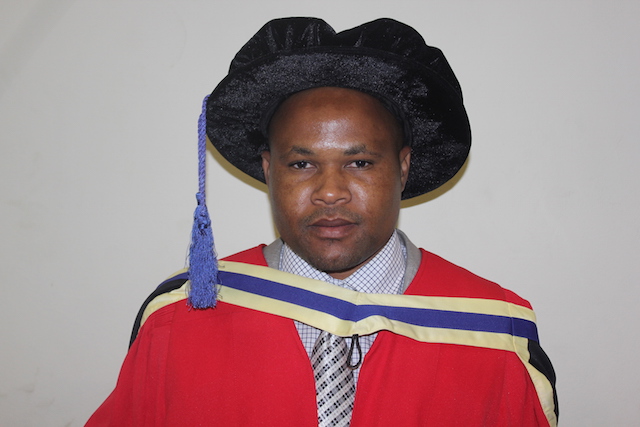A DUT PhD student has graduated from research which could deliver wireless broadband services to millions of people living in rural areas, help security agencies in monitoring crime on the ground as well as save millions of lives during weather disasters by delivering real-time, interactive, multimedia communications to those monitoring the disasters.
Dr Sicelo Sibiya, 32, who conducted doctoral research on the Integration of Satellite System and Stratospheric Communication Platforms (SCP) for weather Observation, graduated with a Doctor of Philosophy Degree in Information Technology today (Thursday, 1 September 2016) at the Fred Crookes Sports Centre, DUT Steve Biko Campus.
While Dr Sibiya’s research focused on how SCP can be used on meteorological applications, the platforms have other uses, such as crime monitoring; for example, the smuggling of stolen vehicles through northern KwaZulu-Natal into Mozambique, livestock theft as well as rhino poaching.
SCP operates at a stratospheric layer (17-30 km above the ground) which is characterised by minimal wind movement. This means that SCP offer better resolution than geostationary satellites due to their close distance to the object under investigation. Google’s Loon Project, which aims to bring remote parts of the globe online with a ring of floating balloons through the stratosphere, will also use SCP technology to deliver 3G connectivity to areas that are off the grid. According to Dr Sibiya, SCP can a better alternative to satellites which are expensive and lack upgrade capabilities.
“To cover South Africa including the ocean, we would need ten to fifteen platforms. An SCP can cover up to 600km area of the ground. The other advantage of SCP is that you can take them down to fix it as opposed to satellites. In extreme weather conditions, the platform would allow specific agencies to make real time decisions, provide broadband communications in rural areas, provide e-government services and provide monitoring and security, for example, the linking of cow tags with the system in order to track livestock movement”, said Dr Sibiya.
To date, Dr Sibiya has presented his research at conferences, including international. He is also willing to present it to government and Africa at large.
With regards to the feat of completing a grueling PhD degree, Dr Sibiya said he has mixed feelings. “Getting my PhD is one of those things that I’ve always wanted to achieve to improve my title. I am excited however and am hoping that it will open doors for me,” he said, adding that he still wants to continue adding to the country’s knowledge production which will help it move forward.
Dr Sibiya currently works as an executive at an IT company.
– Sinegugu Ndlovu
Pictured: DUT PhD graduand, Dr Sicelo Sibiya.


